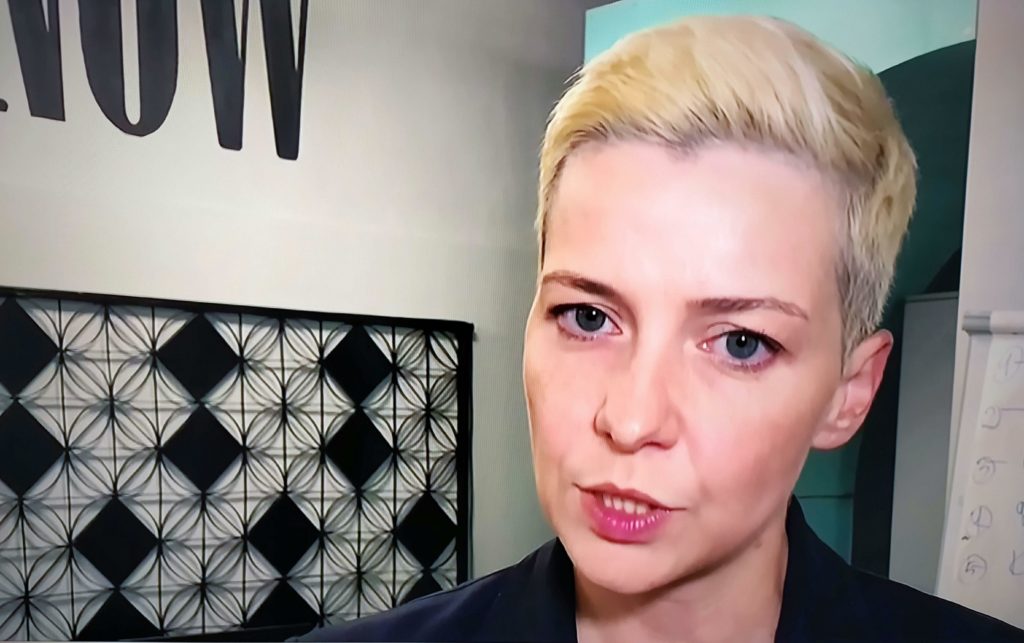Belarus steamrolled ahead with its mass repression of opposition activists, with a court imposing long jail terms on two prominent opponents of President Alexander Lukashenko, obliged by events to rely increasingly on Moscow to stave off Western opprobrium and sanctions.
Maria Kolesnikova, one of three women who spearheaded last year’s ultimately unsuccessful election campaign against the president, was jailed for 11 years on charges of extremism and trying to seize power illegally.
Lawyer Maxim Znak was handed a 10-year term — both very long sentences in what has become the norm in the president’s efforts to crush all opposition to his 27-year-long rule.
Western denunciations of the closed trial’s predictable outcome and demands for the release of all “political prisoners” were not long in coming – in keeping with tough European Union sanctions imposed in June and aimed at hobbling the ex-Soviet state’s export potential.
“The EU deplores the continuous blatant disrespect by the Minsk regime of the human rights and fundamental freedoms of the people of Belarus,” read a statement issued by the 27-nation EU. “The EU will continue its efforts to promote accountability for the brutal repression by the Belarusian authorities.”
U.S. Secretary of State Antony Blinken deplored the “politically motivated conviction and shameful sentencing” of the two activists.
Kolesnikova, a musician, helped oversee the campaign of Svetlana Tikhanovskaya in taking on Lukashenko in the August 2020 election – the president won re-election to a sixth term in a landslide, but unprecedented crowds poured into the streets of Minsk and other cities to denounce the outcome as rigged.
Along with a third woman activist, Veronika Tsepkalo, they launched into the campaign when prominent male candidates were jailed or prevented from standing. Kolesnikova had headed the presidential election campaign of banker Viktor Babariko, seen as the most popular political figure in Belarus. He was arrested and jailed for 14 years on corruption charges.
Unlike her two comrades, Kolesnikova resisted attempts to make her leave Belarus – and famously destroyed her passport as an attempt was made to dump her at the Ukrainian border.
Activists show support
While the trial was closed, sentencing was open to the public and the Nexta opposition telegram channel showed a queue of sympathisers trying to file into the courtroom to offer support. Kolesnikova was shown flashing her trademark heart sign with her hands despite being constrained by handcuffs.
Tikhanovskaya, who calls herself the legitimately elected president of Belarus, is one of many dissidents exiled in neighbouring Lithuania. She called Kolesnikova and Znak heroes who “aren’t guilty of anything. It’s terror against Belarusians who dare to stand up to the regime. We won’t stop until everybody is free in Belarus.”
Lukashenko has appeared increasingly erratic in recent months after the brutal suppression of demonstrations – with more than 30,000 people detained at one time or another – snuffed out the protest movement.
He sealed the country’s borders and altered the constitution, apparently to give his eldest son more authority, after he and Kremlin leader Vladimir Putin announced that security forces had exposed a Western-backed coup that was being plotted against him.
A turning point in the West’s attitude to Belarus came with the diversion to Minsk in May of a Lithuania-bound scheduled flight and the arrest of a dissident journalist on board. The EU denounced “state air piracy” and slapped unprecedented sanctions on the country’s economic lifelines, mainly lucrative exports of potash, a key element in fertiliser.
As Lukashenko moved closer to his sole source of support in Moscow, Lukashenko also increased the frequency of his meetings with Putin. The Kremlin leader has been pressing him to move faster on implementing the terms of a longstanding “union state” – despite the Belarusian leader’s misgivings that this could culminate in his country being swallowed up by Moscow.
Military shipment, joint exercises
Lukashenko said earlier this month that Russia would soon deliver a big military hardware consignment to Belarus, a sign of unflinching support in the midst of the country being shunned in the West.
“Russia in the near future…will supply us – I won’t say how much money or what – with dozens of planes, dozens of helicopters, the most important air defence weapons,” the BelTA news agency quoted Lukashenko as saying. “Maybe even S-400s (surface-to-air missiles). We need them very much as I’ve said in the past.”
Russian and Belarusian forces are set to hold large joint military exercises this month. And Lukashenko and Putin are due to hold another round of talks in Russia within the next week.

